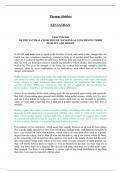Resume
Summary Reading guide of Thomas Hobbes Leviathan CHAPTER XIII OF THE NATURAL CONDITION OF MANKIND AS CONCERNING THEIR FELICITY AND MISERY
In this document you'll find a paragraph by paragraph reading guide for Thomas Hobbes Leviathan CHAPTER XIII OF THE NATURAL CONDITION OF MANKIND AS CONCERNING THEIR FELICITY AND MISERY. Each paragraph is explained and simplified for you to better understand Hobbes' approach.
[Montrer plus]



